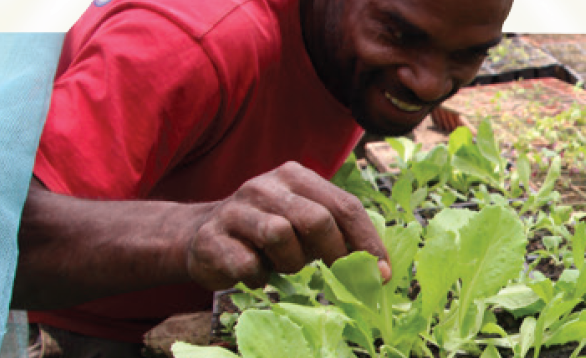PAPP KRA/Indicator
KRA 2 – Improve the dissemination and adoption of applied agricultural production research technologies
Indicator 2 – At least 5 new collaborations with schools
Results to date – New collaborations with 4 schools.
Country/s
Vanuatu, Fiji
Context
Increasing rural to urban migration, lack of income generating opportunities, low status/interest in agriculture, and difficulties with access to land/land tenure are just some of the issues affecting young people across the Pacific.
The Marist Tutu Rural Training Centre (TRTC) on the island of Taveuni, Fiji, was established in 1969 and has been running their Young Farmer Training Course since 1983. Its stated purpose is “to help form and train young single men from the province of Cakaudrove to be autonomous, responsible, and mature young adults who are principle-led decision-makers, able to take control of their own lives and choose freely to live as farmers on their own land, accept their call to be of the village and be able to live in the service of others in their society”. From the 224 young men who have participated in the Tutu course to date, 206 (92%) are still farming as their main source of livelihood. This so-called ‘Tutu model’ is recognised across the Pacific region as ‘best practice’, with significant scope for it to be adapted to other countries.
Following a visit to TRTC, the Vanuatu Farm Support Association (FSA) has adapted the Tutu model in the Middle Bush area of Tanna island, Vanuatu, creating the Vanuatu Young Farmers Development (VYFD) Course at Napil Rural Training Centre (Napil RTC) in 2012.
Intervention
The Vanuatu Farm Support Association (FSA) requested support through the PAPP-PIFON partnership for technical assistance for a review to assess the effective application of the ‘Tutu model’ at Napil. This assistance was provided through a consultant who has had significant experience with Tutu and Fr. Petero Matairatu from TRTC.
The Review assessed the effectiveness of the ‘Tutu model’ at the Napil pilot in terms of providing self-employment in agriculture, and documented the lessons learnt from this experience. It made recommendations for scaling up the Napil RTC and replicating it at other locations in Vanuatu.
Impacts
The review showed that after only 18 months of operating, the Napil RTC has already demonstrated significant positive impacts for the local Middle Bush and wider Tanna community. Thirty three young farmers (including 11 women) were enrolled, as at December 2014; the trainees typically only have a primary school level of formal education.
A key condition for entry into the VYFD Course is a signed agreement from the participant’s parents and the village chief that land in their home situation will be allocated to them for a period of at least three (3) years. The area of village owned land allocated to the participants has ranged from 0.25 to 0.5 hectare. Such land arrangements are seen as pioneering in terms of the involvement of village based youth in commercial agriculture, particularly young village women.
A bank account was established for each trainee at commencement of the course. Vegetables grown by trainees on Centre land are sold at the Lenakel market and all of the proceeds are paid into the trainee’s saving bank accounts. As of June 2014, there was an overall total of 290,000vt in trainees’ savings accounts.
The trainees are entirely responsible for marketing the products grown on their home farms. One of the trainees has entered into a contract to supply vegetables to the Tanna Evergreen Resorts and Tours. He attributes this achievement to his involvement in the VYFD Course.
A main focus of the program is on the participants growing their own vegetable seedlings. The Napil Centre provides the vegetable seeds for the participants – free to the trainees in their first year, at 50% of cost in their second year, and at full cost recovery in their final year. Napil seeds and seedlings are also available for purchase by other farmers on Tanna. The availability of seeds and seedlings has made a significant contribution to the recent increase in fresh vegetable supplies on Tanna.
Village farmers, beyond just the young trainees, have been introduced to farming systems that enhance productivity and land use sustainability. This provides an important demonstration for farmers in other locations facing similar problems.
The PAPP-PIFON Review made a number of recommendations to improve the operation, efficiency, applicability and reach of the VYFD Course. These included:
- Secure ongoing funding, including the development of some financial self-sufficiency.
- Procure a full-time admin/finance staff member, and introduce a higher staff to trainee ratio.
- Introduce more specialised skills training to the curriculum, possibly through teaching ‘slots’ by outside trainers.
- Course entry requirements should become more stringent now that the course is established.
- Reduce the duration of course to 2 years (currently 3yrs).
- Upskill core staff, including through staff technical exchanges.
- Build outreach for raising the profile and understanding of what the RTC does.
FSA and Napil RTC have since been working to implement the recommendations from the PAPP-PIFON review, and have already seen improvements in areas such as:
- Refinement of the curriculum and entry requirements;
- Increase in student intake and decrease in drop-out rate;
- Funds have been secured and plans put in place to replicate the Napil model in another area of Vanuatu.
See an overview of the Tutu Rural Training Centre Model and the Napil Rural Training Centre.





CONNECT WITH US